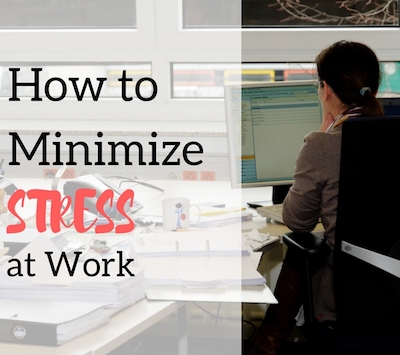How to Minimize Stress at Work: Wellness Wednesday with Nicole Porter
The following has been contributed by Vancouver-based wellness educator and holistic nutritionist Nicole Porter. She specializes in helping busy professionals live more balanced, less stressful lives.
October’s Healthy Workplace Month might have come to an end, but stress in the workplace will always exist. As a Nutritionist and Wellness Consultant who typically works with busy, stressed out professionals (sound familiar?), I know that the most common stressor is work, often because of tight deadlines, struggling to find work/life balance, conflicts with colleagues, or adapting to new technologies. And although a little bit of stress is okay (it helps us gain clarity and get things done urgently), problems arise when stress is chronic, contributing to issues ranging from fatigue to headaches to weight gain to serious disease.
But those aren’t the only stresses we need to manage. There are other hidden stressors that impact your body, hormones and health in the exact same way as the work stresses listed above. These include stressors such as poor nutrition, lack of sleep, dehydration, excessive screen time, intense exercise, and dieting. Even the negativity typically associated with dieting and body image has been shown to cause stress on the body. And if studies estimate that up to 95% of disease is stress-related, it’s time we get this stress thing under control.
To understand what stress is doing to your body, we need to talk a bit of physiology. Keep in mind that your body is a beautiful, amazing thing, constantly making adjustments to find a state of balance so you stay alive. When you’re under stress, your body thinks your life is at risk, so it reacts by protecting you.
 The response starts in the brain, which immediately releases hormones that cause a number of reactions in the body. Your heart starts to pound and blood pressure increases (to send oxygen and blood to your muscles so you can fight or flee from your threat), pupils dilate (so you can see your threat clearer), digestion halts (because when you’re running for your life, eating is the last thing your body is interested in doing), and various tissues are broken down into glucose, increasing blood sugar levels (so your body has energy to fight or flee).
The response starts in the brain, which immediately releases hormones that cause a number of reactions in the body. Your heart starts to pound and blood pressure increases (to send oxygen and blood to your muscles so you can fight or flee from your threat), pupils dilate (so you can see your threat clearer), digestion halts (because when you’re running for your life, eating is the last thing your body is interested in doing), and various tissues are broken down into glucose, increasing blood sugar levels (so your body has energy to fight or flee).
These are just a few changes that occur so the body can move it’s energy into dealing with the immediate stressor. Anything that is not urgent (reproduction, immune function, growth and tissue repair) will get put on the back burner.
The exact same stress response happens when you’re dehydrated, sleep deprived, drink too much caffeine or alcohol, cut carbs or calories, eat too much protein, work out too much, have too much inflammation, eat too much sugar. This is only a partial list! In the end, your body doesn’t know if you are angry at your boss, just ate a sugar-filled dessert, are worried about mortgage payments or if you starved yourself of carbohydrates all day. Stress is stress is stress.
So how do you deal with stress in the workplace?
1. Take screen breaks throughout the day. Use that time to go for a walk, stretch or take deep breaths. You’ll calm your nervous system, breathe some fresh air, and get the movement your body and lymphatic system need. Shut down electronics an hour before bed. A good night’s sleep will also help you at work.
2. “When walking, walk. When eating, eat.” This is an old zen proverb that basically means ‘stop multi-tasking’, especially when you’re eating. Remember how digestion stops when you’re under stress? If you’re trying to eat while working, texting or driving, your body is under stress, which means digestion isn’t happening, which can affect every organ in your body.
3. Stop dieting. Whether you’re cutting carbs, eating excessive protein, eliminating fat, or even judging yourself for not having the body or level of health you want, dieting is a stress on the body that can sabotage the greatest health efforts, impacting hormones, memory, weight, blood sugar and more.
4. Adjust your perception of stress. We are the only animals on earth that can create our own stress. We aren’t running from a lion in the jungle and our lives are not at risk at work (not usually anyway!), but we react like our lives are at stake when they’re not. A 2012 Harvard Study showed that changing your perception of stress can impact the shape of your blood vessels during stress. Mind over matter!
5. Get your nutrition in check. This is a loaded statement that varies by individual, but just remember that poor nutrition is a stress on the body. Too little water along with too much sugar, caffeine/stimulants, and alcohol are all too common. Avoid trends and find a way of eating that is natural, balanced, and works specifically for you.
As a Registered Holistic Nutritionist, Wellness Consultant, and Healthy Weight Loss Coach Nicole offers Wellness Advantage Programs which are available in person and online. Save $50 when you book a session with Nicole and quote “Miss604”. This offer expires November 30, 2017.
Follow Nicole Porter Wellness on Facebook, Twitter, and Instagram for more information.













1 Comment — Comments Are Closed
These are some great tips! An unhealthy amount of stress also affects office culture and employee productivity. From an employer’s perspective, we highly recommend office yoga and massage therapy sessions. It’s worked great for us so far, and helps us relax and refocus.